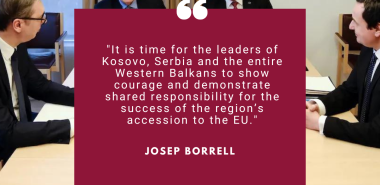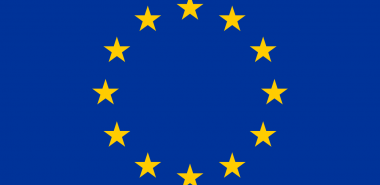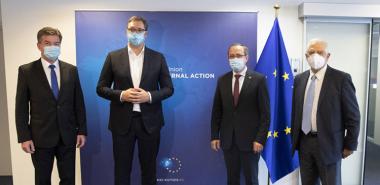Belgrade-Pristina Dialogue
The EU-facilitated Dialogue aims to achieve a comprehensive legally-binding normalisation agreement between Kosovo and Serbia addressing outstanding issues in order for both Parties to progress on their respective European paths, create new opportunities and improve the lives of their citizens. An agreement between the Parties is beneficial also to the security, stability and prosperity of the entire region.
Navigate the topic
About the Dialogue
The Council of the European Union appointed Mr. Peter Sørensen as EU Special Representative for the Belgrade-Pristina Dialogue and other Western Balkan regional issues in January 2025. The mandate of the EU Special Representative is to achieve comprehensive normalisation of the relations between Kosovo and Serbia, improve good neighbourly relations and reconciliation between partners in the Western Balkans, helping them overcome the legacy of the past, enhance the EU’s visibility and effectiveness through public diplomacy, and contribute to the consistency and effectiveness of EU action in the Western Balkans.
EEAS Councillor Robert Cooper initially facilitated the Dialogue at senior officials' level from March 2011 to March 2012. From October 2012 the Dialogue was facilitated at high political level by the EU High Representative for Foreign Affairs and Security Policy/Vice-President of the Commission Catherine Ashton (October 2012 – November 2014),Federica Mogherini (November 2014 – December 2019); and by High Representative for Foreign Affairs and Security Policy/Vice-President of the Commission Josep Borrell (December 2019 – December 2024) and Special Representative Miroslav Lajčák (April 2020 – January 2025).
The Dialogue is at the heart of the EU engagement in the Western Balkans and fully conceived, designed and led by the European Union. It was launched following the adoption of the UN General Assembly Resolution 64/298 (2010): “[The General Assembly] welcomes the readiness of the European Union to facilitate a process of dialogue between the parties; the process of dialogue in itself would be a factor for peace, security and stability in the region, and that dialogue would be to promote cooperation, achieve progress on the path to the European Union and improve the lives of the people”.
In this spirit the EU also continues to work closely with other international stakeholders.
More information
- HR/VP Blog “Belgrade-Pristina Dialogue: Time to take responsibility and move towards the EU” (16/03/2023)
- Belgrade-Pristina Dialogue: Statement by High Representative Josep Borrell (27/02/2023)
- Belgrade-Pristina Dialogue: EU Proposal - Agreement on the path to normalisation between Kosovo and Serbia (27/02/2023)
- Belgrade – Pristina Dialogue: Remarks by High Representative Josep Borrell ahead of the high-level meeting (15 June 2021)
- Remarks by the EU Special Representative Miroslav Lajčák after the high-level meeting (15 June 2021)
- Belgrade – Pristina Dialogue: Remarks by High Representative Josep Borrell ahead of the high-level meeting (7 September 2020)
- Remarks by EU Special Representative Miroslav Lajčák after the high-level meeting (7 September 2020)
- Belgrade – Pristina Dialogue: Remarks by High Representative Josep Borrell ahead of the resumption of talks (12 July 2020)
- Remarks by the EU Special Representative Miroslav Lajčák after the resumption of the Belgrade - Pristina Dialogue (12 July 2020)
- Kosovo-Serbia: High Representative/ Vice-President Borrell speaks to Presidents Thaçi and Vučić
- EU Delegation to Serbia
- EU Delegation to Kosovo



